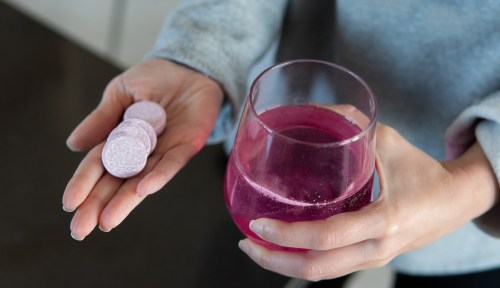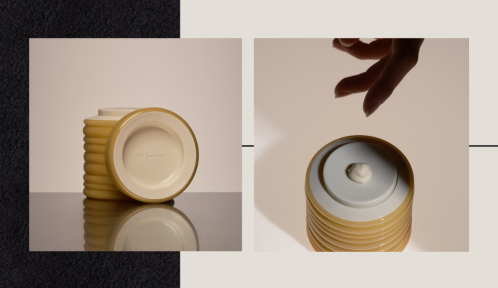Our editors independently select these products. Making a purchase through our links may earn Well+Good a commission
If you get frequent UTIs, and have to run to the doctor to get antibiotics alll the time, you might be wondering if there’s an alternative. You could stroll the holistic remedy aisle of your grocery store for things like D-mannose for UTI prevention, but unfortunately, this natural supplement will not cure your infection. Because UTIs (aka, urinary tract infections) stem from bacteria, antibiotics are the true gold standard for clearing them up.
Experts in This Article
OB/GYN and medical advisor for Flo Health
D-mannose has been advertised as a popular supplement for bladder health. But exactly is it, and what does it do? To find out, we tapped a doctor to learn whether it’s a good UTI prevention option, and other ways to ease UTI symptoms like burning and pelvic pain.
What is D-Mannose?
D-mannose is a simple sugar that’s thought to have antibiotic properties. Small amounts are naturally found in some fruits, including oranges, apples, and peaches, according to a March 2022 review in Nutrition Journal1. You can find it in supplement form, but some brands sell D-mannose powder to mix with water, too.
Some research suggests that D-mannose might be useful for fighting UTIs, the Nutrition Journal review notes. “It prevents E. coli, the bacteria that causes most urinary tract infections, from sticking to the walls of the urinary tract. Presumably, this allows the bacteria to be more effectively flushed out with urine,” says Tiffany Pham, MD, a board-certified OB/GYN and medical advisor at Flo Health.
Do doctors recommend taking D-Mannose for UTIs?
Well, not usually. While the research is promising, the jury’s still out on whether UTIs should be treated with D-mannose. So you shouldn’t use it to self-treat a UTI without talking to your doctor first.
A handful of small studies have shown D-mannose can help fight off a UTI (and help keep them from coming back) in women who are prone to reinfection. But the data isn’t strong enough to recommend D-mannose to treat or prevent UTIs across the board, concluded a August 2022 review in Cochrane Library2 of seven randomized controlled trials. “Currently, we need more research to give us definitive evidence on the effectiveness of this treatment compared to traditional antibiotics,” Dr. Pham says.
That said, it might be worth asking your doctor about D-mannose benefits if you’re having trouble controlling recurrent UTIs, or if you’re unable to take antibiotics to treat a UTI. “Consideration can be made for D-mannose as an alternative, however there should be close follow-up with your medical provider to ensure that the treatment is effective,” Dr. Pham adds.
Who shouldn’t take D-Mannose?
Because D-mannose isn’t a recommended UTI treatment, you shouldn’t take it unless you and your doctor have decided that you’re a good candidate for trying an alternative to antibiotics, says Dr. Pham. That might apply if antibiotics aren’t doing a great job of controlling your recurrent UTIs, or if you have a condition where you can’t take antibiotics.
There’s good reason to be cautious here. Even though D-mannose side effects are minimal and it’s natural, there can be real consequences to attempting to treat UTI without antibiotics (or with a supplement that doesn’t treat infection). “UTIs that are not treated appropriately can progress to a kidney infection,” Dr. Pham says. In rare instances, untreated UTIs can even spread to the bloodstream and lead to sepsis, per the Mayo Clinic.
If you and your doctor are considering trying D-mannose, let them know if you have diabetes or gestational diabetes. High doses of D-mannose can make it harder to manage your blood sugar, the Mayo Clinic notes.
How to use D-Mannose
Like with many other natural UTI remedies, there’s no standard dosage for D-mannose for UTI. Studies have used amounts ranging from 200 milligrams to 3 grams daily, per the Cochrane Library review. If you try it, you and your doctor can decide the dosage for you, Dr. Pham says.
If you’re taking it to prevent UTI, Michigan Medicine recommends to take 1,000 milligrams twice daily, either in powder form (mixing it into a glass of water) or tablet form. Of course, talk to your doctor about whether this dosage is right for you.
Other UTI treatments
Antibiotics are the first-line treatment for UTIs, according to the American College of Obstetricians and Gynecologists (ACOG). The type and dose your doctor prescribes—along with how long you need to take them for—depends on the bacteria that caused your infection and how often you get UTIs. “This is the standard of care,” says Dr. Pham, who emphasizes that UTIs that don’t get treated could morph into more serious infections—especially in your kidneys.
While you’re on antibiotics, there are other things you can do to feel more comfortable. To relieve UTI symptoms, the Mayo Clinic recommends the following:
- Taking UTI pain relievers like AZO, which reduces pain, burning, and the urge to pee while your infection is being treated.
- Drinking plenty of water, which can help flush out infection-causing bacteria. It can also help rehydrate you if you deal with UTI and diarrhea (which can be a side effect of the antibiotics).
- Steering clear of bladder irritants like coffee, citrus, alcohol, or soda.
- Using a heating pad on your lower abdomen and pelvis.
Besides D-mannose, there are other ways to reduce your risk of recurrent UTIs, including the following:
- Cranberry juice or cranberry extract supplements, which might stop UTI bacteria from sticking to the walls of your bladder, according to the ACOG. (But it can’t cure bladder infections; that’s another UTI myth.)
- Vaginal or oral probiotics like lactobacillus or bifidobacteria, which might discourage the growth of bad bacteria in the bladder, suggests a May 2024 randomized controlled trial in Clinical Infectious Diseases3.
- Visiting with a urologist on a regular basis can help keep your bladder health in check, and ensure that underlying conditions (like diabetes or menopause) are not the cause of your recurrent infections.

AZO Urinary Pain Relief — $7.99
When to see a doctor
Let your doctor know if you’re having symptoms that seem like a UTI, the Mayo Clinic recommends. This would include:
- A burning sensation when you pee
- Frequent urination or urge to urinate
- Urine that looks cloudy or smells strong
- Pelvic pain and/or back pain
They can test your urine to confirm the diagnosis, and if so, prescribe an antibiotic that can fight off the infection and help you feel better.
FAQ
Are there any side effects from taking D-Mannose?
D-mannose is generally considered safe for most people, but some people get diarrhea or bloating when they take it, per Michigan Medicine. It can also have an effect on your blood sugar levels, so you shouldn’t take it if you have diabetes or gestational diabetes, Dr. Pham says.
High doses of D-mannose can also potentially cause kidney damage, per the Cochrane Library review. If you and your doctor decide to try D-mannose for your UTIs, be sure to stick with the prescribed dose.
Is D-Mannose a natural antibiotic?
D-mannose has been shown to have antibiotic-like properties, because it makes it harder for UTI-causing bacteria like E. coli to thrive. That said, it’s not a good substitute for prescription antibiotics when you have a UTI, Dr. Pham says.
Does D-Mannose flush out bacteria?
Similar to cranberry juice, D-mannose is thought to make it harder for UTI-causing bacteria to stick to the walls of the urinary tract. That might make it so the bacteria is more easily flushed out when you pee.
Ala-Jaakkola, R., Laitila, A., Ouwehand, A.C. et al. Role of D-mannose in urinary tract infections – a narrative review. Nutr J 21, 18 (2022). https://doi.org/10.1186/s12937-022-00769-x
↩︎Cooper, T. E., Teng, C., Howell, M., Teixeira-Pinto, A., Jaure, A., & Wong, G. (2022). D-mannose for preventing and treating urinary tract infections. Cochrane Database of Systematic Reviews, 2022(8). https://doi.org/10.1002/14651858.cd013608.pub2
↩︎Gupta, V., Mastromarino, P., & Garg, R. (2023). Effectiveness of prophylactic oral and/or vaginal probiotic supplementation in the prevention of recurrent urinary tract infections: A randomized, double-blind, placebo-controlled trial. Clinical Infectious Diseases, 78(5), 1154–1161. https://doi.org/10.1093/cid/ciad766
↩︎
Sign up for the Well+Good SHOP Newsletter
Get exclusive deals on wellness, beauty, fitness, and food products that have been hand-picked by our editors.
Got it, you've been added to our email list.








